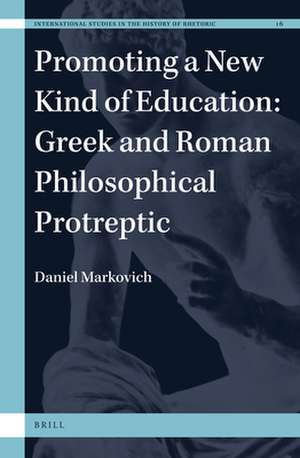Promoting a New Kind of Education: Greek and Roman Philosophical Protreptic: International Studies in the History of Rhetoric, cartea 16
Autor Daniel Markovichen Limba Engleză Hardback – 27 oct 2021
Din seria International Studies in the History of Rhetoric
- 18%
 Preț: 996.91 lei
Preț: 996.91 lei - 18%
 Preț: 1365.08 lei
Preț: 1365.08 lei - 18%
 Preț: 1096.24 lei
Preț: 1096.24 lei - 18%
 Preț: 951.35 lei
Preț: 951.35 lei - 18%
 Preț: 748.43 lei
Preț: 748.43 lei - 18%
 Preț: 719.19 lei
Preț: 719.19 lei - 18%
 Preț: 852.67 lei
Preț: 852.67 lei - 18%
 Preț: 724.13 lei
Preț: 724.13 lei - 18%
 Preț: 597.67 lei
Preț: 597.67 lei - 18%
 Preț: 712.27 lei
Preț: 712.27 lei - 18%
 Preț: 1013.57 lei
Preț: 1013.57 lei - 18%
 Preț: 1165.01 lei
Preț: 1165.01 lei - 18%
 Preț: 791.09 lei
Preț: 791.09 lei - 18%
 Preț: 637.53 lei
Preț: 637.53 lei - 18%
 Preț: 763.50 lei
Preț: 763.50 lei
Preț: 605.48 lei
Preț vechi: 738.39 lei
-18% Nou
Puncte Express: 908
Preț estimativ în valută:
115.90€ • 125.93$ • 97.41£
115.90€ • 125.93$ • 97.41£
Carte indisponibilă temporar
Doresc să fiu notificat când acest titlu va fi disponibil:
Se trimite...
Preluare comenzi: 021 569.72.76
Specificații
ISBN-13: 9789004467231
ISBN-10: 9004467238
Dimensiuni: 155 x 235 mm
Greutate: 0 kg
Editura: Brill
Colecția Brill
Seria International Studies in the History of Rhetoric
ISBN-10: 9004467238
Dimensiuni: 155 x 235 mm
Greutate: 0 kg
Editura: Brill
Colecția Brill
Seria International Studies in the History of Rhetoric
Cuprins
Preface and Acknowledgments
Abbreviations
1 Introduction: A New Way of Living
1 From Socratic Protreptic to Philosophical Protreptic
2 Philosophical Protreptic as a Form of Deliberation
3 Reading Philosophical Protreptic
2 Entering the Dialogue: Socrates and the Socratic Authors
1 Aeschines of Sphettos
2 Plato
3 Xenophon
4 Conclusions
3 Philosophy as Theoretical Observation: Aristotle’s Protreptic
1 The Reconstruction of Aristotle’s Protreptic
2 The Content of Aristotle’s Protreptic
3 Aristotle’s Dialogue with Plato
4 Aristotle and Isocrates
5 Aristotle and His Audiences
6 Conclusions
4 Philosophy as Therapy: Hellenistic Authors
1 Expanding the Audience
2 Epicurus: Happiness for Everyone
3 Early and Middle Stoic Authors
4 The New Academy: Philo of Larissa
5 Middle Platonism: Eudorus of Alexandria
6 Conclusions
5 Philosophy and Politics: Roman Paideia
1 Greek Philosophy in Rome
2 Lucretius: A View from Above
3 Cicero: Platonic Politics
4 Seneca: A Fellow Convalescent
5 Conclusions
6 Socrates in Rome: Greek Authors of the Empire
1 Being a Philosopher in the Period of the Second Sophistic
2 Musonius Rufus: Lucius’s Socrates
3 Epictetus: Arrian’s Socrates
4 Dio of Prusa: Socrates in Exile
5 Lucian of Samosata: Protreptic under a Comic and Satirical Mask
6 Excursus: Exhortations to Medicine and to Christianity
7 Conclusions
7 The Unity of Philosophy Reclaimed: Neoplatonism
1 Neoplatonic Tendencies
2 Iamblichus: A Protreptic Anthology
3 Themistius: Philosophy and Rhetoric Reconciled
4 Boethius: A Protreptic to Himself
5 Conclusions
Conclusions
1 Typical Arguments
2 The Protreptic Worldview and The Philosophy of Education
3 Rhetorical Strategies
4 Rhetorical Goals
5 Philosophical Protreptic and Other Types of Philosophical Literature
Epilogue
Appendix: Examples of Philosophical Protreptic
Editions, Commentaries, and Translations
Secondary Bibliography
Indices
Abbreviations
1 Introduction: A New Way of Living
1 From Socratic Protreptic to Philosophical Protreptic
2 Philosophical Protreptic as a Form of Deliberation
3 Reading Philosophical Protreptic
2 Entering the Dialogue: Socrates and the Socratic Authors
1 Aeschines of Sphettos
2 Plato
3 Xenophon
4 Conclusions
3 Philosophy as Theoretical Observation: Aristotle’s Protreptic
1 The Reconstruction of Aristotle’s Protreptic
2 The Content of Aristotle’s Protreptic
3 Aristotle’s Dialogue with Plato
4 Aristotle and Isocrates
5 Aristotle and His Audiences
6 Conclusions
4 Philosophy as Therapy: Hellenistic Authors
1 Expanding the Audience
2 Epicurus: Happiness for Everyone
3 Early and Middle Stoic Authors
4 The New Academy: Philo of Larissa
5 Middle Platonism: Eudorus of Alexandria
6 Conclusions
5 Philosophy and Politics: Roman Paideia
1 Greek Philosophy in Rome
2 Lucretius: A View from Above
3 Cicero: Platonic Politics
4 Seneca: A Fellow Convalescent
5 Conclusions
6 Socrates in Rome: Greek Authors of the Empire
1 Being a Philosopher in the Period of the Second Sophistic
2 Musonius Rufus: Lucius’s Socrates
3 Epictetus: Arrian’s Socrates
4 Dio of Prusa: Socrates in Exile
5 Lucian of Samosata: Protreptic under a Comic and Satirical Mask
6 Excursus: Exhortations to Medicine and to Christianity
7 Conclusions
7 The Unity of Philosophy Reclaimed: Neoplatonism
1 Neoplatonic Tendencies
2 Iamblichus: A Protreptic Anthology
3 Themistius: Philosophy and Rhetoric Reconciled
4 Boethius: A Protreptic to Himself
5 Conclusions
Conclusions
1 Typical Arguments
2 The Protreptic Worldview and The Philosophy of Education
3 Rhetorical Strategies
4 Rhetorical Goals
5 Philosophical Protreptic and Other Types of Philosophical Literature
Epilogue
Appendix: Examples of Philosophical Protreptic
Editions, Commentaries, and Translations
Secondary Bibliography
Indices
Notă biografică
Daniel Markovich, Ph.D. in Classical Philology, University of Illinois at Urbana-Champaign (2006), is an Associate Professor in Classics at the University of Cincinnati. He has published on Greco-Roman rhetorical theory, Roman Epicureanism (including a monograph on The Rhetoric of Explanation in Lucretius’ De rerum natura, Brill 2008), and Roman reception of Empedocles.
